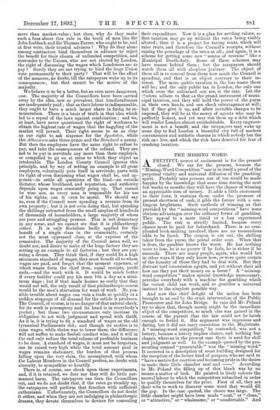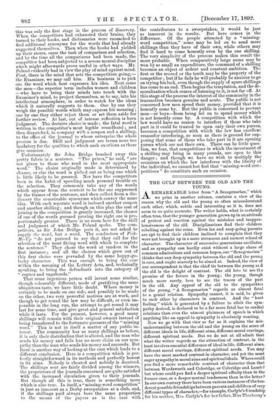THE MISSING WORD.
AFRUITFUL source of excitement is for the present closed. We say for the present, because the "Missing-Word Competition " case is in itself a proof of the perpetual vitality and universal diffusion of the gambling spirit. Probably nine persons out of ten would be made happier by the knowledge that some time during the next few weeks or months they will have the chance of winning an appreciable sum of money. It adds a little excitement to their lives, it sustains them under the pressure of present shortness of cash, it gilds the future with a con- tingent brightness. Such methods of winning as that provided by the " missing-word competitions " have some obvious advantages over the ordinary forms of gambling.
They appeal to a more timid or a less experienced public. The risk is strictly limited, because every chance must be paid for beforehand. There is no com- plicated book-making involved, there are no tremendous odds to be faced. The coupon is cut out, the shilling taken from the purse, the postal order sent. When that is done, the gambler knows the worst. He has nothing more to lose, he is no poorer if he fails, he is richer if he succeeds. There are many people, again, who would bet in other ways if they only knew how, or were quite certain of the honesty of those they had to deal with. But they distrust turf commission agents, and yet without their aid how can they put their money on a horse ? A " missing- word competition" makes special knowledge unnecessary, provides everybody with a machine for gambling which the veriest child can work, and so gratifies a universal instinct in the simplest possible way.
And now this chief delight of the nation has been brought to an end by the cruel intervention of the Public Prosecutor and Sir John Bridge. In vain did Mr. Poland try to show that, though money might be the immediate object of the competitors, so much else was gained in the course of the pursuit that the law could not be harsh enough to forbid it. His argument was ingenious and daring, but it did not carry conviction to the Magistrate. A "missing-word competition," he contended, was not a, lottery, because a lottery implies chance, and nothing but chance, whereas in the present case there is need for skill and judgment as well. In the example quoted by the pro- secuting counsel " presentable " was the " missing word." It occurred in a description of some building designed for the reception of the better kind of paupers, who are said to "have a motive for exertion and becoming pride in the desire to make their little chamber neat and —." According to Mr. Poland the filling up of this blank was by no means a matter of luck. He painted in lively colours the mental labour to which the competitors submitted in order to qualify themselves for the prize. First of all, they set their wits to work to discover some word that would fill the gap. In the case quoted, the choice was large. The little chamber might have been made " neat," or " clean," or " attractive," or " wholesome," or " comfortable." And this was only the first stage in the process of discovery. When the competitors had exhausted their brains, they turned to their books, and dictionaries were ransacked to find additional synonyms for the words that had already suggested themselves. Then when the books had yielded up their stores, came the task of comparison and selection, and by the time all the comparisons had been made, the competitor had been subjected to a severe mental discipline which might afterwards prove useful in other ways. Mr. Poland evidently had in view the play of mind against mind. First, there is the mind that sets the competition going,— the Examiner, we may call him. His business is to pick out the word which best expresses his idea. Next come the men—the superior term includes women and children —who have to bring their minds into touch with the Examiner's mind, to project themselves, so to say, into his intellectual atmosphere, in order to watch for the ideas which it naturally suggests to them. One by one they weigh the possible words which may express his meaning ; one by one they either reject them or set them aside for further review. At last, out of intense reflection is born judgment. The decisive choice is made ; the fatal word is written in the competitor's most legible roundhand ; and then dispatched, in company with a coupon and a shilling, to the office of the journal to whose enterprise the whole process is due. Skill and judgment are terms none too laudatory for the qualities to which such exertions as these give occasion. Unfortunately Sir John Bridge brushed away this pretty fabric in a sentence. "The prizes," he said, "are not given to those who send in the most appropriate word." The choice originally made is determined by chance, or else the word is picked out as being one which is little likely to be guessed. Nor have the competitors been in the habit of spending much personal trouble on the selection. They commonly take any of the words which appear from the context to be the one suppressed by the framer of the sentence, and then collect from a dic- tionary the conceivable synonyms which convey the same idea. With each separate word is inclosed. another coupon and another shilling ; and though on this plan the cost of joining in the competition is greatly increased, the chance of one of the words guessed proving the right one is pro- portionately greater. There is no room here for the skill and judgment of which Mr. Poland spoke. The com- petitors, as Sir John Bridge puts it, are not asked to supply the word, but a word. The conductors of Pick- Me- Up " do not. pretend to say that they call for the selection of the most fitting word with which to complete the sentence." They chose the word at random in the first instance ; and all the choices which grew out of this first choice were pervaded by the same happy-go- lucky character. This was enough to bring the case within the meaning of the Lottery Acts, and, technically speaking, to bring the defendants into the category of rogues and vagabonds."
That some ingenious person will invent some similar, though colourably different, mode of gratifying the same ubiquitous taste, we have little doubt. Where money is certainly to be made on one side, and possibly to be made on the other, two very powerful motives are at work, and though to get round the law may be difficult, or even im- possible in the long run, the attempt to get round it may last for some time, and give great and general satisfaction while it lasts. For the present, however, a good many shillings will remain with their original owners instead of being transferred to the fortunate guessers of the " missing word." This is not in itself a matter of any public in- terest. The community has as many shillings as before, it is only their distribution that is altered, and the man who sends his money and fails has no more claim on our sym- pathy than the man who sends his money and succeeds. But there is another way of looking at the case which leads to a different conclusion. Here is a competition which is per- fectly straightforward in its methods and perfectly honest in its aims. Nobody is cheated and nobody is deceived. The shillings sent are fairly divided among the winners, the proprietors of the journals concerned are quite satisfied with the increased circulation given to their journals. But though all this is true, there is something more which is also true. In itself, a "missing-word competition" is just as innocent as a Derby sweepstakes at a club, and, if the shillings paid always bore the same proportion to the means of the payers as is the case with the contributors to a sweepstakes, it would be just as innocent in its results. But here comes in the difference. Of the people attracted by a "missing- word competition," some may be led on to send more shillings than they have of their own, while others may find it hard to come honestly even by the one shilling. The very simplicity of the process makes this result the more probable. When comparatively large sums may be won by so small an expenditure, the command of a shilling becomes an object of ardent and constant ambition. The first or the second or the tenth may be the property of the competitor ; but if he fails he will probably be anxious to go on trying his luck, even though the supply of spare shillings has come to an end. Then begins the temptation, and the de- moralisation which comes of listening to it, is not far off. At this stage of the process the interest of the community in the transaction becomes genuine and acute. The public is not concerned how men spend their money, provided that it is honestly come by. But the public is concerned to prevent men—or boys—from being led on to spend money which is not honestly come by. A competition with which the law would have no reason to interfere if those who take part in it could be trusted to open only their own purses, becomes a competition with which the law has excellent reasonfor interfering, so soon as there is ground for sup- posing that some of those who take part in it are opening purses which are not their own. There can be little ques- tion, we fear, that competitions in which the investment of a shilling may bring in many pounds, are open to this danger ; and though we have no wish to multiply the occasions on which the law interferes with the liberty of the individual, we cannot but feel that "missing-word com- petitions " do constitute such an occasion.







































 Previous page
Previous page